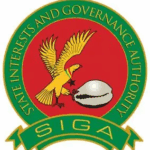
The State Interests and Governance Authority (SIGA) has launched the 2024 State Ownership Report (SOR), providing an in-depth analysis of the financial and operational performance of Ghana’s State-Owned Enterprises (SOEs), Joint Venture Companies (JVCs), and Other State Entities (OSEs).
The report, unveiled in Accra on Friday, 29th August 2025, marks the ninth edition of the series and the fourth produced by SIGA since its establishment in 2019.
According to the statement, it is intended as a tool to guide policymakers, stakeholders, and the public in evaluating the effectiveness of state entities as engines of growth and providers of essential services.
“Through rigorous analysis and data-driven insights, we aim to inform stakeholders and drive meaningful dialogue around the future of our State-Owned Enterprises, Joint Venture Companies, and Other State Entities,” said Acting Director-General of SIGA, Professor Michael Kpessa-Whyte.
The 2024 SOR covers 152 specified entities, up from 147 in the previous year, reflecting expanded oversight. For the first time in three decades, the State Housing Company paid dividends to government, joining two other entities Ghana Reinsurance Company and TDC Company Ltd in contributing GH¢29.36 million, a 78.88 per cent rise from 2023.
The report also highlighted persistent gender gaps within state entities. Women made up only 29.67 per cent of the total workforce in 2024, while female representation at executive management and board levels remained below the 30 per cent threshold mandated by the newly enacted Affirmative Action Act, 2024.
Youth participation was described as “alarmingly low,” with only 2.61 per cent of employees aged below 25.
On the policy front, the report highlighted reforms including the adoption of the State Ownership Policy and a new Code of Corporate Governance, both launched in 2024 to standardise governance practices across public institutions.
The Minister for Finance, Cassiel Ato Forson, conceded that challenges persist, particularly in the operational weaknesses and debts of SOEs. However, he stressed that government remains committed to enforcing fiscal discipline and restructuring poorly performing entities under the IMF-supported Post COVID-19 Programme for Economic Growth (PC-PEG).
“The expectations of the Ghanaian people are that SOEs must deliver and offer an attractive value proposition as their shareholders,” Dr Forson said, urging SIGA to impose sanctions on non-compliant entities.
SIGA reiterated its pledge to strengthen transparency, accountability, and fiscal responsibility, working with the Ministry of Finance to ensure that specified entities play a central role in Ghana’s economic recovery and long-term development.